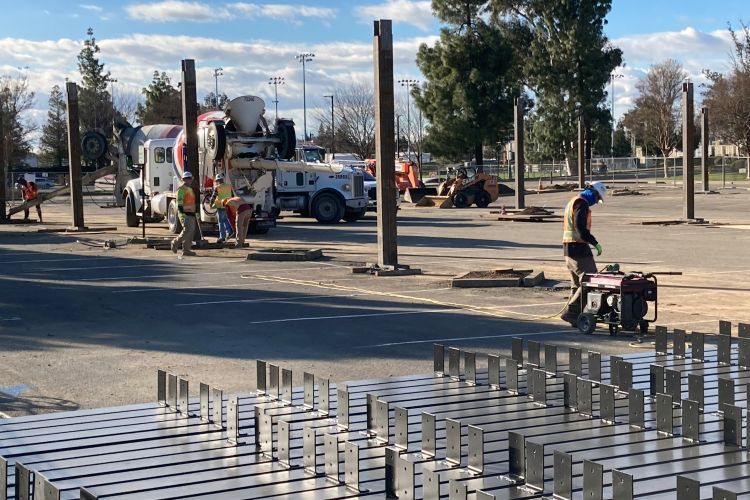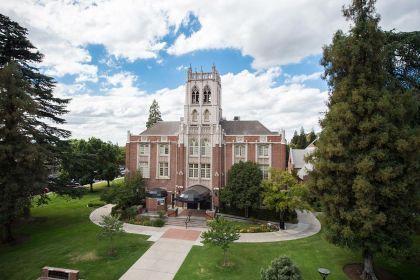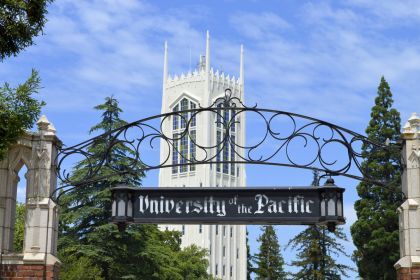Breadcrumb
Solar project to make Pacific a leader in renewable energy among U.S. campuses; No. 2 in solar energy

The planned solar canopies will cover spaces in eight parking lots spread across the 175-acre northern California campus on both sides of the Calaveras River
A major new solar power initiative at University of the Pacific will make the Stockton campus of California’s first university one of America’s leaders in renewable energy on college campuses.
The project, working with Tesla, will provide more than 30% of the overall energy needs of the campus. Pacific will be generating more of its energy needs from solar power produced on campus than all but one other university in the nation, according to Sustainability Tracking, Assessment & Rating System reports.
The planned solar canopies will cover spaces in eight parking lots spread across the 175-acre northern California campus on both sides of the Calaveras River. Harnessing power from the sun, these panels will generate 5.3 megawatts of electricity and have one megawatt of battery storage.
"We are proud to take this national leadership role in campus-based sustainability and renewable energy efforts," said Pacific President Christopher Callahan. "The solar project is just the latest example of Pacific's tradition of leadership through innovation and our focus on reducing our carbon footprint."
The project also includes the installation of 16 electric vehicle charging ports throughout campus. Should demand increase for the ports, infrastructure will be in place for the university to expand the number of charging ports in the future.
“We are incredibly fortunate to be working with Tesla, as they are one of the industry leaders in electric vehicles and clean energy,” said Graeme Mitchell, former assistant vice president of facilities at Pacific, who initiated the relationship. “This will establish Pacific as an industry leader in sustainability among all higher education institutions.”
The solar canopies will bring additional benefits. A renewable energy system this size is estimated to generate the electricity equivalent of removing over 1,000 cars from the road every year, provide the equivalent energy use for over 650 homes annually and avert over 5,000 metric tons of greenhouse gasses annually.
“This project demonstrates Pacific's ongoing commitment to energy conservation and environmentally sound practices for current and future generations,” said Jessica Bilecki, sustainability director at Pacific. “We put into practice our value of civic responsibility by developing renewable energy resources for our community.”
In addition to the electricity generated by the solar panels, this project will provide experiential learning opportunities for Pacific student researchers and faculty, who will have access to solar data for assessment.
“This project will enable our faculty and students to gain a practical understanding of renewable energy as well as create hands-on learning opportunities—one of the important and distinctive features of a Pacific education,” said Provost Maria Pallavicini.
The solar project with Tesla is just the latest sustainability initiative at Pacific.
The university is ranked second nationally for the highest percentage of campus-owned vehicles that are 100% electric, according to a survey released by the Environment America Research and Policy Center.
The Ted and Chris Robb Garden, established in 2012 by former Regent and Whole Foods co-CEO Walter Robb, grows organic produce that is made available to students, local community members, faculty and staff. It is also a living laboratory where students have the opportunity to study ecosystems, food systems, soil composition, nutrition, seasonality, crop rotations, food disposal, marketing and garden design.
The Pacific Green Team is a community of student volunteers who work to increase landfill diversion rates by monitoring waste stations and Green Move In/Out areas, ensuring recyclable and compostable materials are kept out of the landfill. Students also stage a green fashion show annually, showcasing their hand-crafted renewable and recyclable clothing and accessory designs.
“Seeing students learn about a variety of sustainability efforts is really rewarding,” Bilecki said. “I am proud of all the ways Pacific is committed to creating a culture that advances a sustainable future for our community.”
Construction of the solar canopies has already begun and should be ready early next year.




